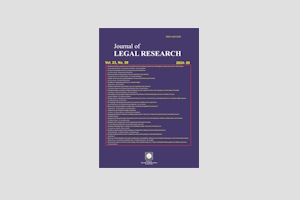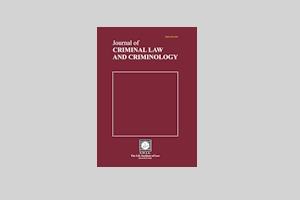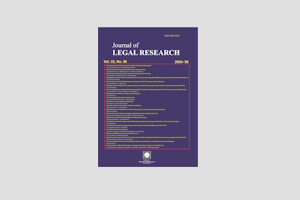Journal of
LEGAL RESEARCH
Number 31
Vol. XVI ● No. 1
Spring – Summer 2017
Managing Editor: Vahid Eshtiagh
Editor-in-Chief: Seyyed Ghasem Zamani
CONTENTS
Articles
Derogation of Human Rights in Situation of Public Emergency
Dr. Seyed Ghasem Zamani & Marzieh Esfandiary
Poverty Reduction: A programme for Social Development in International Law
Dr. Reza Eslami & Mahshid Ajeli Lahiji
Protection of Human Rights Law in Cyberspace
Dr. Seyed Yaser Ziaee
Analysis of Iranian Legislation in Petroleum Investment
Dr. Hamid Bagherzadeh & Dr. Raheleh Seyed Morteza Hosseiny
Third Executive Protest in Execution of Civil Judgements Law
Dr. Rasol Parvin & Amin Pahkideh & Elahe Etemadi
Regular Assignment of Judicial Cases from the Perspective of Judicial Independence: A Comparative Study in Iranian Law and International Documents
Omid Rostami Ghazani
The Role of Claimant and Prosecutor in Offences against Historical and Cultural Heritage
Dr. kyoumars kalantari & Hassan khodabakhshi palandi & Amir Erfanifar
Legal Protection of Historical and Cultural Monuments against Environmental Pollution
Amin Valizadeh & Saber Nojomi
Ramsar Convention on Wetlands from the Perspective of International Environmental Law
Mehrdad Mohammadi & Vahideh Najafi
Vicious Cycle of Enacting Local Duties in City Councils and Revocation in Court of Administrative Justice Judges Council: Discussion of Judicial Supervision on Urban Development in Contradiction with the Right to Property of People (2009-2016)
Dr. Vahid Agah & Mohammad Nabi Boorboori
The Class Action Code: A Model for Civil Law Countries
Author Professor Antonio Gidi & Persian Translator Dr. Majid Pourostad
Articles
Derogation of Human Rights in Situation of Public Emergency
Dr. Seyed Ghasem Zamani
Associate Professor of International Law – Allameh Tabataba’i University
&
Marzieh Esfandiary
MA of International Public Law – Allameh Tabataba’i University, Responsible Author
Abstract:
According to human rights conventions and the relevant case-law, a state of emergency can be justified only by an exceptional situation of crisis which affects the whole population and constitutes a threat to the organized life of the community of which the state is composed. The threat must be imminent; its effects must involve the whole nation; the continuance of the organized life of the nation must be threatened; the crisis or danger must be exceptional in the sense that the normal measures or restrictions permitted by the Convention for the maintenance of public safety, health and order, are plainly inadequate. In a state of emergency measures can be taken that derogate from the protection normally afforded by human rights. Rights are not absolute and may legitimately be limited by law. But derogation must be proportional to the emergency. People can only be detained without trial for the specific purpose of restoring peace and order during an emergency. The government will have to justify the continued detention of such people to a court, and there are still certain rights that it is not permissible to derogate from.
Keywords: Human Rights, Derogation, Public Emergency, Terrorism, Absolute Rights, Jus Cogens.
Poverty Reduction: A programme for Social Development in International Law
Dr. Reza Eslami
Assistant Professor of Shahid Beheshti University
&
Mahshid Ajeli Lahiji
P.H.D. Student of International Law, Allameh Tabataba′i University
Abstract:
All people deserve the inherent right to an adequate standard of living. Thus when some people are suffering from poverty, some economic – social rights of human beings are being breached. Fighting against poverty is one of the most important parts of social development process in order to reach the goals such as equality, justice, social coherence and global peace. The factor is recognized by the international law documents and some solutions are provided to eliminate poverty.
By ignoring the existence of poverty, there will be much more problems in both national and international levels. Poverty will give rise to deprivation and insecurity. Therefore in a programme for social development the importance of policy making in order to gain empowerment and improving social protection systems should be noted. Moreover, at international law cooperation is one of the main elements of social development which can remove poverty.
Keywords: Social Development, Elimination of Poverty, Policy Making, Cooperation.
Protection of Human Rights Law in Cyberspace
Dr. Seyed Yaser Ziaee
Ph. D. in International Law, Assistant Professor of International Law, Qom University
Abstract:
Internet has two contrary aspects: as a mean for promoting human rights and as a mean for violation of human rights. Violations of human rights law in cyberspace have special kinds and it is necessary to find appropriate mechanisms for protection of human rights.
There are some theories for attribution of human rights violations to a State like authority power, nature of act, hot pursuit, et. It’s possible some individual and human freedoms be breached in cyberspace like freedom of speech, freedom of access to information, freedom of assembly, right to self-determination, right property, right to privacy, et. There are some mechanisms for protection of human rights in cyberspace like cyber international organizations and cybercrime complaint submission websites, these are called cyber self-government. Also it is possible for Root Server State to guarantee human rights in other States as a third party for protection of human rights.
Keywords: Cyberspace, Protection of Human Rights Law, Ensure to Protection of Human Rights Law, Attribution of Wrongful Acts to States, Human Rights, International Law.
Analysis of Iranian Legislation in Petroleum Investment
Dr. Hamid Bagherzadeh
Teacher at University and Attorney at Law
&
Dr. Raheleh Seyed Morteza Hosseiny
Assistant Professor, Faculty of Law and Political Science of Kharazmi University
Abstract:
Iran as second gas and third oil world power, has a good capacity to absorb international investment but its legislation hasn’t took a fixed policy for investment in petroleum. International investment in recent decades take account as an acceptable method in petroleum however, it was forbidden by some particular laws in oil and gas field. In parallel with normal laws, there are some temporary laws, which are performed in specified period. In performance period of these kind of laws (which are nominated as development acts), any contrary law don’t be execute. In this article firstly, it is tried to distinguish between available investment methods in up-stream and down-stream. Secondly, it is in attempt to find appropriate legal way to contracting and finally, some suggestion to Iranian parliament have be presented in order to take some easier approach for petroleum investors.
Keywords: Investment, Contract, Petroleum, Up-stream, Down-stream.
Third Executive Protest in Execution of Civil Judgements Law
Dr. Rasol Parvin
Assistant Professor of Islamic Azad University, Kermanshah Branch
&
Amin Pahkideh
Ph.D. Student of Islamic Azad University, Kermanshah Branch and Educator
&
Elahe Etemadi
Master of Law and Educator
Abstract:
On the strength of articles 146/147 of the law execution of Civil judgements, Whenever the third person asserts a right with regard to attached property, Should the said claim is supported with final judgement or natural document dated prior to date of attachment, the attachment will be discharged otherwise the execution operation will be followed and the claimant may litigate for suppression of execution operations and proving the claim concerned. Third person complaint at all stages will be heard without observing civil procedure code and paying any legal costs whatsoever. The text of complaint will be served to both parties and the court will examine evidence of both parties as well as third party in any manner and place it may deem appropriate and if the court finds that grounds of complaint is plausible, an stay order is issued pending the complaint in finally adjudicated.
If third party wants to eliminate the arrest, court can issue the arrest elimination order by taking the security and if the condemned person neglects the mentioned property, Investigation of third protest claim will be cancelled.
Keywords: Objection, Third Party, Executive, Third Party Objection, Third Party Objection to Executive Judgement.
Regular Assignment of Judicial Cases from the Perspective of Judicial Independence: A Comparative Study in Iranian Law and International Documents
Omid Rostami Ghazani
Ph.D. Student in Criminal Law and Criminology of Tehran University
Abstract:
Assignment of cases to judicial authorities where there are multiple branches of court is the prerequisite for checking existence of jurisdiction and exercise of it. Ensuring actual and apparent independence of the judicial system requires that assigning of cases to the courts would be in jurisdiction of authority that placed in the judiciary and the executive and the legislature powers and parties of dispute should not be able to interfere in this issue. Assignment of cases must be made by a competent judicial authority or supervised by him. Assignment of cases can be made in various forms that in this paper they has been studied from the perspective of judicial independence. There are different arrangements for the assignment of cases that can be summarized on two kinds: “random assignment” and “specialized assignment”. The second kind is the kind that Iranian law emphasizes. Judicial independence requires that with assignment the case to the court, except in cases prescribed by law, there is no possibility of returning it. This paper has attempted to explain the rules governing the assignment of case with their adaption with international standards of fair trial (and especially judicial independence).
Keywords: Assignment of Cases, Judicial Authority, Judicial Independence, Returning of Case.
The Role of Claimant and Prosecutor in Offences against Historical and Cultural Heritage
Dr. kyoumars kalantari
Professor of Criminal Law of Law and Political Science Faculty, University of Mazandaran
&
Hassan khodabakhshi palandi
Master of Criminal Law Faculty of Law and Political Science, University of Mazandaran
&
Amir Erfanifar
Ph.D. in Criminal Law and Criminology at Shahid Beheshti University
Abstract:
The importance and value of historical and cultural heritage caused protection and preservation of this heritage by criminal sanctions. This affair in our country becomes more important given the history of ancient civilization, plenty of rich cultural heritage and historical monuments. After revolution, the legislator predicted penal provisions with regarding to the constitution in order to maintain the historical and cultural heritage. Nevertheless, the Islamic Penal Code in 1996 considered these offences as forgivable. It seems that we should pay attention to social interests and philosophy of criminalization about these offences. This is necessary to consider the evolution of legislation and role of private complainant and the prosecutor in these offences. New Islamic Penal Code and new criminal procedure act are worth noting in this context. Especially new criminal procedure act with regard to the role of NGOs is considered a big step towards the development of the prosecution and the investigation into these crimes.
Keywords: Historical and Cultural Heritage, Claimant, Cultural Heritage Organization, Non-Governmental Organization (NGO).
Legal Protection of Historical and Cultural Monuments against Environmental Pollution
Amin Valizadeh
Ph.D. Student of International Law, Islamic Azad University
(Sciences and Researches Branch)
&
Saber Nojomi
MA in International Law at University of Allameh Tabataba’i
Abstract:
At present the environmental pollution at the earth has reached alarming border. The environmental pollution, as a technical term, means the presence of undesirable substances in the Environment. Apart from the effects of pollutions on animals and plants, they leave effects on objects and buildings including historical and cultural monuments. Given that the majority of historical and cultural monuments have been built in stone or they are stone monuments, available pollutants through making corrosion historical and cultural monuments, rubbing and deforming them cause damages. In recent decades, historical and cultural monuments have faced various pollutions from oil and chemical pollution to air pollution through dust particles and pulverizing material.
So far, numerous attempts have been conducted to deal with environmental pollution at regional and international level coming to approving hundreds of conventions and protocols on international and regional level in this case. Fortunately, modern man realized the importance of historical and cultural monuments, but he has not taken an important step on to protect the common heritage of mankind.
The current paper, through investigating fundamentals of the international environmental laws as well as treats associated to the available historical and cultural monuments, is to introduce suggestions on protecting such heritage at the domain of international laws.
Keywords: Legal Protection, Historical and Cultural Monuments, The Environment, International Responsibility, The 1972 World Heritage Convention.
Ramsar Convention on Wetlands from the Perspective of International Environmental Law
Mehrdad Mohammadi
Ph.D. Student of International Law, Shahid Beheshti University
&
Vahideh Najafi
Master of International Law, Allameh Tabataba’i University
Abstract:
Native plants and animals, including certain species, grow in wetlands. Due to their potential economic, cultural, scientific and recreational value, it is highly important to protect them. Wetlands not only provide part of the aquifers and groundwater, but provide a favorable environment for birds and fisheries. Despite these valuable benefits, these rich ecosystems are threatened by different risks. One of the major causes of wetland degradation and destruction is the human factor. Today, destruction of wetlands and pollution of coastal waters, such as ozone depletion crisis, deforestation and the extinction of many plant and animal species have become global environmental crisis. This study seeks to explain the role of wetlands in international environmental rights and obligations of States regarding their protection, with an emphasis on the Ramsar Convention.
Keywords: International Environmental Law, Wetlands, Ramsar Convention, States Obligations.
Vicious Cycle of Enacting Local Duties in City Councils and Revocation in Court of Administrative Justice Judges Council: Discussion of Judicial Supervision on Urban Development in Contradiction with the Right to Property of People (2009-2016)
Dr. Vahid Agah
Assistant Professor of Public Law at Allameh Tabataba’i University
&
Mohammad Nabi Boorboori
L.L.MA in Public Law, Department of Public and International Law, Damavand Branch,
Islamic Azad University, Damavand, Iran
Abstract:
One of the main duties of city council is enacting local duties and according to 170th principle of the Constitution, the resolutions of city council due to recognition as regulation, may be voidable in court of administrative justice judges council. This issue is examined from viewpoint of regarding ownership right of people with legitimacy of receiving cash and non-cash local duties by local agents of government from 2009 to 2016 and issuing void judgments and it was concluded that, court of administrative justice was successful for defending ownership right based on previous criterions for revocating the resolutions of city councils; nevertheless, it is very far away from status of “adjudication” as mentioned in 173th principle of The Constitution. In order to solve the shortages of court of administrative justice the following recommendations are offered: From viewpoint of precedent, by using the capacity of second part of article 13 of law of court of administrative justice, revocation the regulation limiting the right to property shall be extended to time of revoke, and re-confirmation of voided resolution recognize non-performance, and shall have the same sanctions. From viewpoint of legislation, it is recommended first, amendment articles 13 and 92 of law of court of administrative justice in order to obtain clear text. Second, from viewpoint of administrative and judicial busy work of chief of court of administrative justice, to refer to administrative prosecutor’s office at level of judge’s council for supporting freedoms and rights of people.
Keywords: The Right to Property, Court of Administrative Justice Judges Council, Revocation the Regulations, Local Duties, City Council.
The Class Action Code: A Model for Civil Law Countries
Author: Professor Antonio Gidi
Antonio Gidi, Visiting Assistant Professor, Syracuse University; LLB, Federal University of
Bahia; L.L.M. and Ph.D., PUC University, Sao Paulo; SJD, University of Pennsylvania
Law School
&
Persian Translator: Dr. Majid Pourostad
Assistant Professor of Civil Procedure and Member of Law Faculty at the Islamic Azad University
Central Tehran Branch (IAUCTB), assisted by Samira Mahdavi & Maryam Farzad
Abstract:
The author proposes the enactment of a Class Action Code in civil law countries. The proposed model code extensively regulates all aspects of modern class actions, including standing, adequacy, prerequisites, certification, notice, proof, settlement, judgment, res judicata, lis pendens, attorney fees, injunctive class actions, class action for damages, calculation of damages, distribution of the award, fund for group rights, defendant class actions, etc.
The objective is to inspire the creation of the best possible code for class action suits, in light of the needs and peculiarities of civil law countries and the international experience with class actions. Although the proposal is focused primarily on civil-law countries, it may also prove useful to common law countries considering the adoption or improvement of class action rules.
Keywords: Class Action, Collective Action, Group Rights, Associational Standing.





